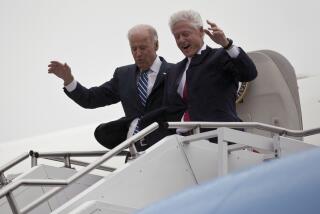COLUMN LEFT : Will Clinton’s Centrist Ways Disarm Bush? : Home from his bumbling trip, he’ll find even businessmen defecting from the GOP.
- Share via
What was supposed to be comeback month for George Bush, a month in which he would shore up his sagging image in time for the election year, is beginning to look more like boomerang month instead. His trip to Southeast Asia and Japan to bring down trade barriers is having perverse effects on his political as well as physical health. The presence of 21 overpaid corporate executives on the presidential trip (many, the heads of failing businesses) is a reminder to anxious American workers that life is even less fair than they thought. Ironically, by focusing attention on the decline of the American auto industry, the trip has reinforced a widespread American insecurity about our ability to compete in the world.
The second event this month that is likely to boomerang is the State of the Union address. In the fall, as Bush’s popularity was sliding from stratospheric to pedestrian, the White House announced that the President would announce a plan of action on Jan. 28, thereby guaranteeing that this would be the most oversold State of the Union address in history. Having created impossibly high expectations, Bush must now articulate a way to end the recession, a domestic policy and a compelling reelection theme.
Part of the State of the Union will no doubt fall into the category of making a silk purse out of a sow’s ear. Because of the recession, housing prices and interest rates have dropped, making home ownership more affordable to more Americans than at any time in the past 15 years. To emphasize the point, Bush may propose a tax credit for first-time home buyers. Also under consideration are a variety of tax-relief proposals for the middle class, including a tax credit for the purchase of health insurance, a nod, at least, toward growing anxiety over the high cost of insurance.
Bush will also attempt to reassure America that he has a domestic policy. He can claim the work of two of his best Cabinet secretaries, Jack Kemp at HUD and Lamar Alexander at Education, even though his own involvement with them has been ephemeral at best. Kemp, who managed to get the President’s attention long enough to take him on one trip to a tenant-managed housing project, has had to carry the fight for tenant management and ownership of public housing virtually alone against a largely unsympathetic Congress. Alexander got more of Bush’s time when the Administration announced, with great fanfare, the President’s education bill, “America 2000,” last spring. But when it came time to shepherd it through Congress, Bush let Alexander fight the battle alone; as a result, the House and Senate bills bear little relationship to the much vaunted “America 2000.”
But while the recession and the President’s anemic domestic efforts are old news, the third roadblock to Bush’s comeback is, in some ways, the most surprising one of all.
For some years now it has been an article of faith among Republicans that no matter how bad things may be for their candidate, the Democratic Party will suffocate even its most attractive nominee with the demands of its liberal interest groups. And yet a funny thing has happened in the race for the Democratic nomination. While conventional wisdom has focused on the challenge Bush faces from the right wing of his own party, it has became more and more likely that he may be the first Republican in nearly a decade to face a Democratic challenge to the center.
That challenge could come from Arkansas Gov. Bill Clinton, the apparent front-runner in the Democratic race and a new breed of Democrat against whom it will be difficult to run the same old liberal-bashing campaign. Clinton’s unique blend of liberal and conservative gives him the potential to cut into the immense center of the electorate. On the campaign trail he recounts story after story of Democrats who want to come home, such as the policeman who grabbed him in an airport to tell him he was “dying to vote for a Democrat again.” And he has been sought out by conservative businessmen in Orange County and New York City who wanted to meet him, despite his Democratic background, because of the depth of their worries over the economy and their unhappiness with Bush.
The President is famous for his ability to practice, when necessary, no-holds-barred politics. But his style of politics, which has relied on cheap appeals to people’s fears and attacks on his opponent’s patriotism, requires a Democratic opponent willing to walk into the standard Republican traps. The really bad news for Bush’s comeback month is that such an opponent may not be forthcoming.
More to Read
Get the L.A. Times Politics newsletter
Deeply reported insights into legislation, politics and policy from Sacramento, Washington and beyond. In your inbox twice per week.
You may occasionally receive promotional content from the Los Angeles Times.










